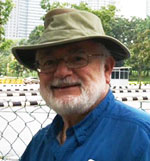© By Oliver B. Pollak

RICHMOND, California — Sports, recreation, athletics promote healthy living, competition and social networks. They can be lifelong habits, even obsessions. When a team member dies they are missed, mourned, and remembered by the remaining teammates. You will not get this from reading newspaper obituaries. Joseph Goldstein and Peter Craig are examples.
Joseph Goldstein was born in Winnipeg, Canada in 1915. He and his wife Reva moved from Canada to Southern California in 1948. He gave up winter sports for softball’s warmer playing fields. They lived in the San Fernando Valley and retired to Leisure World in Orange County. Reva, his wife of 50 years died in 1990. He loved the L.A. Dodgers and would sit in his La-Z-Boy watching a game, his portable radio on his tv table covering another game. In retirement he was an active bowler and softball player, sports that involved teams and leagues. Joe died at the age of 87, in 2002.
He played these sports well into his 80s when cancer reduced his mobility. He played pinochle and talked on the phone with his buddies. After he died we disposed of much of his furnishings. We gathered his sports mementoes. I had given him John Feinstein’s A Good Walk Spoiled (1995). More important were the dozen cute 4-inch-tall bowling pins containing dated tournament personal high scores. His teammates signed a softball and gave it to his daughter Karen. We created a nook including a matchbook from their 25th wedding anniversary. Joe smoked a pipe until it became unfashionable.
In October 2017, Peter Craig, the brother of our friend Joyce Craig, died at the age of 74 from bone cancer. Karen knew him from Fairfax High School. He was an accountant with a gift for editing and sports, especially golf. His Los Angeles Times obituary is loving and respectful. Like Joe’s obituary, the sports dimension was silent.
Peter’s library contained Bob Rotella’s Golf is Not a Game of Perfect (1995), a book he also gave to friends. The size of his library had been reduced by dispersion after the death of his wife Judith in 2011, and further downsizing. Among the remains were a 1966 printing of Strunk and White The Elements of Style, employed to enhance student writing skills.
Peter in his younger years was a competitive swimmer, life guard, slalom skier, and avid tennis player. For the past several years he golfed regularly twice a week at 5 am at public courses with his Rosewood Elementary School buddies. He modified the grips to accommodate his psoriatic arthritis.
Peter played thousands of games and saved six golf balls in a decorated wooden box brought over from Austria by his parents in the late 1930s. Two were from bucket list grounds, St. Andrews, one from New Zealand, and two dated, for unknown reasons 9/13/94 and 11/23/95. Perhaps unforgettable experiences, extraordinary scores, or a hole in one.
Decline was inexorable. Treatment perhaps delayed the inevitable. Being on the disabled list he dropped out of the normal athletic rotation. Even when Peter could not play he rode on the cart.
As team members, Joe and Peter were missed in the lineup. Teams and foursomes had to be regrouped. Families grieve for fathers, grandfathers, brothers, and uncles. Teammates grieve for the camaraderie of the diamond and links, symbolized by a round sphere 1.680 or 3.5 inches in diameter. Uniform numbers were not retired but gloves lay empty. The teams convened a memorial lunch, invited the family, and honored life and athletic prowess.
Their legacies are similar. The families suggested donations to the Martin Goldstein Scholarship Fund at Sonoma State University, and the Director’s Discretionary Fund for Writing Programs at UCLA College of Letters & Science. In death as in life, education animated these sportsmen.
*
Pollak is a freelance writer based in Richmond, California.